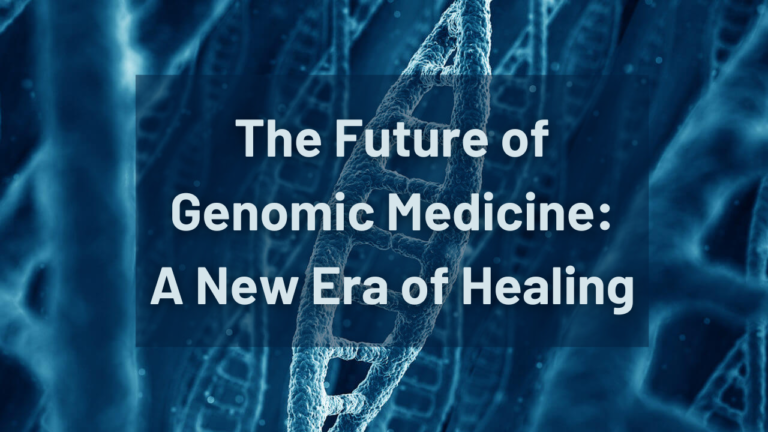
by Aiman Shabbir
Genomic medicine—the use of genetic information of patients to predict risk of disease and administer customized medication, has ability to transform health care. Currently a whole human genome can be sequenced for under $1000, and for even less it is possible to read targeted parts of the genome (panels) or the protein coding part (the exome). The genome is the complete set of information in an organism’s DNA. Genomic medicine has great potential for diagnoses or disease prediction, disease prevention and, targeted treatment.
Brief Overview of Human Genome Project
Genomic medicine is an interdisciplinary medical specialty involving the use of genomic information that has rapidly grown since the completion of the Human Genome Project (HGP) more than a decade ago. Completed in 2003, the HGP was a thirteen-year project coordinated by the US Department of Energy and the National Institutes of Health to sequence the complete human genome from volunteers who provided DNA samples. We can use our knowledge of the human DNA sequencing and genome to help advance medical treatments. It is hoped that information from the Human Genome Project will allow scientists to develop new ways of treating or diagnosing illnesses, especially genetic disorders and cancer. Experts have explained how human genome project contributes to precision medicine in this video that’s part of the NIH office of intramural training and education summer lecture series.
Applications of Genomic Medicine
More and more medicines can be developed now that the sequence of the human genome is known. Being able to target diseases with specific medicines, and using gene therapy to treat diseases on a patient-by-patient basis, has ability to revolutionize modern medicine. Patients can also respond to drugs differently. Sometimes one disease can be caused by a variety of different mutations or risk factors. Pharmacogenetics, the study of an individual’s genome to predict how they will respond to a drug treatment. This type of medicine will also help to make sure that drugs are only used if the doctors know they are going to work. This means the patient is more likely to respond to the drugs and also reduces the use of ineffective drugs, saving limited resources.
Precision medicine
The goal of precision medicine is that instead of a “one size fits all” approach by disease type, medicine will be informed by a genetic understanding of the disease. After that targeted prevention or treatment approaches to help specific individuals stay healthy or get better instead of relying on approaches that are the same for everyone could be achieved.
CRISPR
Clustered Regularly Interspaced Short Palindromic Repeats (CRISPR) was originally discovered by yogurt engineers Philippe Horvath and Rodolphe Barrangou. The knowledge of CRISPR can be used to reprogram DNA using an enzyme called CRISPR-associated protein 9. A commonly used analogy is to think of CRISPR Cas9 as a text editor for the genetic code, with the ability to cut out or permanently replace DNA. With the ability to cut out and replace the “bad” DNA with “good” DNA, CRISPR Cas9 offers considerable promise to cure several cancers, solid tumors, melanoma, leukemia, HIV, β-thalassemia, sickle-cell anemia, and other diseases.
Gene Therapy
Gene therapy is a type of treatment in which healthy foreign genetic material is inserted into a person’s cells to cure a rare condition or disease. Instead of only treating symptoms, gene therapy aims to correct the underlying genetic cause of the disease and, thus, serve as a one-shot cure. Gene therapy can be applied to cancer immunotherapy through the use of chimeric antigen receptor (CAR) T-cell therapy with one’s own immune cells to find and destroy cancer cells. CRISPR Cas9 has enabled next-generation CAR T-cells to enhance the therapeutic potential of CAR-T cell treatments.
While gene therapies are becoming available, they are not yet affordable to the general public. Kymriah is priced at $475,000, and Luxturna, which is used to treat a rare form of vision loss, has a list price of $850,000.
Genetic Counseling
There is rapid rise in mainstream precision medicine and genetic testing, many health care providers are not trained to interpret genetic tests or communicate test results and providing the patients with help with decision-making for their patients. This has led to growth in genetic counseling, a medical field in which professionals with genetics backgrounds are able to weigh the needs of their patients and the impact of genetic results on the patients’ family members to promote “autonomous decision making.
Future Prospects
It is important to realize, however, that it often takes considerable time, effort, and funding to move discoveries from the scientific laboratory into the medical clinic. Most new drugs based on genome-based research are estimated to be at least 10 to 15 years away, though recent genome-driven efforts in lipid-lowering therapy have considerably shortened that interval. According to biotechnology experts, it usually takes more than a decade for a company to conduct the kinds of clinical studies needed to receive approval from the Food and Drug Administration.
Ethical and Social Implications
Ethical, legal, and social implications (ELSI) of genomic medicine encompass a wide array of concerns and considerations. At the forefront lies the issue of privacy and confidentiality, with concerns revolving around the secure storage, sharing, and protection of sensitive genetic information. Ensuring robust legal frameworks that address data protection and access rights becomes imperative to safeguard individual privacy. Informed consent, another ethical cornerstone, poses challenges due to the complexity of genomic data, necessitating clear communication and understanding of the implications of genetic testing and data usage.
In the scientific arena, maintaining integrity and ethics in genetic research mandates adherence to responsible conduct, including proper consent, protection of vulnerable populations, and transparent reporting, prompting legal guidelines and oversight mechanisms. Additionally, cultural and social perspectives must be respected in the ethical and legal realms, acknowledging diverse beliefs and values surrounding genetics and healthcare.
This article was written by Aiman Shabbir, a content creator at WEmpower Pakistan and Masters student at Quiad-i-Azam Univeristy, Pakistan.


Recent Comments